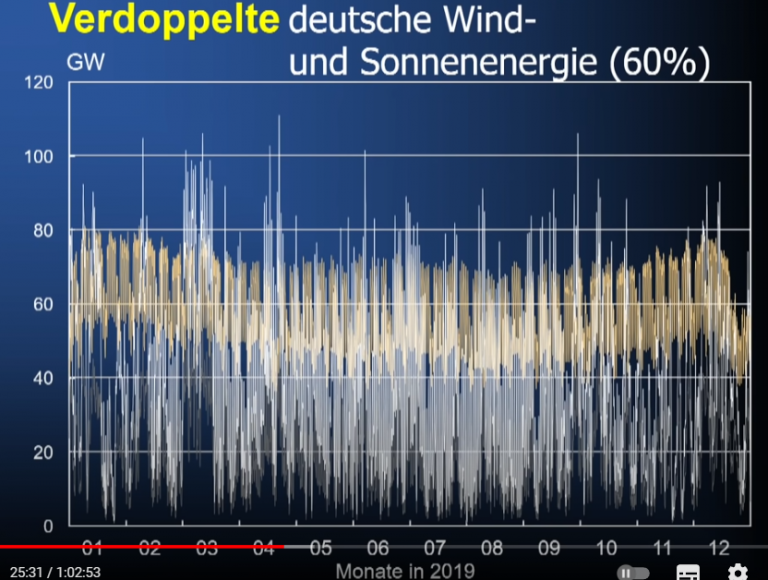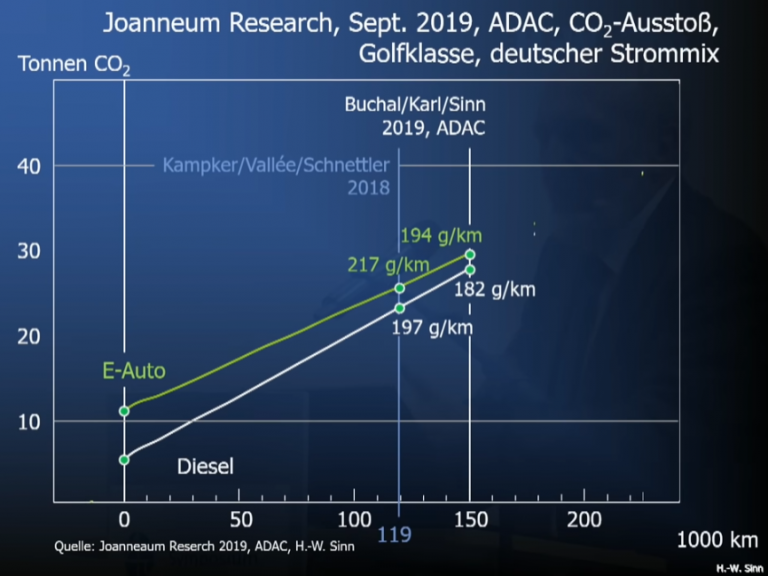Leading German economist Hans Werner Sinn sees 6 major problems with Europe’s green energy transition (Energiewende) and warns other nations against following the German energy model.
Problem no. 1: The Paris Accord is non-binding
The Paris Accord in fact has been signed by only 61 of 191 nations and so pledge to reduce their emissions, i.e. more than two thirds of the globe’s nations are not obliged to do anything.
This will simply allow the rich signatories to outsource their emissions to unconstrained nations. China and India both end up with a free pass. The Paris Accord will have no effect on global emissions and citizens of rich countries will be forced to make huge sacrifices. We’re seeing it today already.
Problem No. 2: EU targets are “utopian”
The former IFO head calls the EU’s targets “utopian” and adds: “Germany at the same time wants to exit coal and nuclear power, thus making itself dependent on other nations.” Like Russia.
The belief that the EU can power itself solely using volatile renewables like wind and sun is kept alive purely by “propaganda media”. In fact it is doomed to fail.
Problem No. 3: Volatile energy supply
Prof. Sinn explains that another major problem is: “Electricity from wind and sun is too volatile to assure an affordable and complete power supply. Even if Germany doubles it’s current wind and solar production capacity, doing so will only double the volatility of the supply:
As the chart above shows, a doubling of the 2019 wind and solar capacity would lead to numerous times of severe oversupply and periods of extreme undersupply for Germany’s roughly average 60 GW of demand. Chart cropped here.
Problem No. 4: Innovation through government decreed central planning?
“Europe is squeezing out the auto industry and violating the law of ‘one price’. The market as a discovery process to innovate low CO2 technologies is being shut down,” Sinn explains.
Instead of allowing the market to naturally find the best and most efficient solutions, Brussels is simply doing it by decree. In the end, we’ll end up with a failed centrally-planned economy.
Problem No. 5: E-cars are not clean
One problem today already, using Germany’s current electric energy supply mix, electric cars are emitting far more CO2 over their lifetimes than conventional combustion engine vehicles.
Even after 150,000 km of driving, a diesel Golf-class car emits less CO2. Chart: H.W. Sinn.
Yet, governments are aiming to force citizens to drive e-cars. In many countries, this will lead to more CO2 emissions, and not less.
Problem No. 6: Europe going without fossil fuels will have zero global impact
According to Prof. Sinn: “With tradable fossil fuels, Europe going without will not have just a tiny effect, but rather have no effect.”
Whatever fuels Europe opts not to use, other countries will simply burn them instead. As long as global oil production keeps growing, so will CO2 emissions – no matter what Europe does, decrees or decides
Summary
Sinn wraps up his presentation with a warning for Europe: “Europe’s unilateralism with climate policy will undermine the competitiveness of its industries, initiate its downfall and thus discourage other countries from following the the European – and especially the German – approach.”







Excellent article: Going fully green ist Selbstmord of any modern society.
Article missed the main point.
Nut Zero will cost a huge amount of money and labor hours for the bizarre purpose of making the electric grid less reliable.
Those investment dollars and labor hours will not be available for goods and services people actually want, making their lives better. Perhaps a cure for cancer. Or just better roads.
It takes imagination to understand the opportunity costs of the Nut Zero project. Imagining many good things that won’t happen when investment money and labor hours are mandated for windmills, solar panels and batteries.
And in the end. there is a more than small possibility that Nut Zero will be a failure, to be followed by a “Repair the Broken Electric Grid Project”, that will also a lot of money and labor hours, with high opportunity costs all over again !
“Those investment dollars and labor hours will not be available for goods and services people actually want, making their lives better. Perhaps a cure for cancer. Or just better roads.”
How about food on their tables?
Heat, water, light, the bare necessities of living. Once entire industries, e.g. aluminum, smelting, and soon, the automobile industry, have left Germany, where will these people work in order to support their families.
It’s no longer a question of improving our lot. It’s a question of keeping above even an existential minimum. Venezuela is perhaps a sad example of where the increasingly communist policies spewing from Brussels will lead.
But at least we won’t have any light pollution anymore… ( /S )…
“Whatever fuels Europe opts not to use…”
Until Europe comes to its sense and starts making friends with Russia, the options are going to be very limited.
Point number 6 is the most telling. Going net zero doesnt actually make a difference.
[…] German Economics expert Sees 6 Formidable Problems With Germany’s Green Energy Push […]
>EU: we must save the planet by “reducing emissions”.
>EU is just small part of the planet and everybody else isn’t “reducing emissions”.
And there are a lot of things this guy missed:
Like hauling cargo from the other side of the planet when it could just be manufactured locally.
Or the battery tech question, until better batteries aren’t developed the green energy push will never happen but they can’t do that because that means civilians being able to be energy independent.
Meanwhile Across The Channel
“‘Ministers quietly abandon ‘green crap’ as focus shifts to food security’. The threat of starvation, like the prospect of hanging, concentrates the mind:”
https://www.powerlineblog.com/archives/2022/06/a-heartwarming-headline.php
Too soon to tell if it will bring real good news, but we can hope.
[…] From the NoTricksZone […]
[…] From the NoTricksZone […]
[…] From the NoTricksZone […]
[…] 로부터 NoTricksZone […]
[…] Are from NoTricksZone […]
[…] From the NoTricksZone […]
[…] economist Hans Werner Sinn identifies six major problems with Europe’s fanciful plan to transition to wind and solar […]
[…] economist Hans Werner Sinn identifies six major problems with Europe’s fanciful plan to transition to wind and photo voltaic […]
[…] economist Hans Werner Sinn identifies six major problems with Europe’s fanciful plan to transition to wind and photo voltaic […]
[…] economist Hans Werner Sinn identifies six major problems with Europe’s fanciful plan to transition to wind and solar […]
I think that this is brilliant! Concisely, clearly, smartly shows how absurd the doomsayers are. Very practical points.
Sadly, pretty much all the doomsayers are so locked in on their narrative, this would simply result in robotic cognitive dissonance.
Would love to see a similar rebuke of the terribly tenuous points that doomsayers have made on their “science”… that is, the key but bogus points that prop up their hysteria.